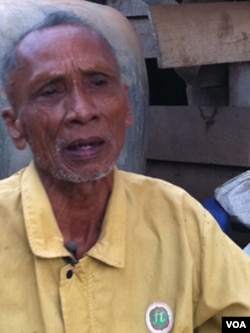In an exclusive interview, Ta An, a former Khmer Rouge commander whose name is among those up for investigation by the Khmer Rouge tribunal, denied overseeing atrocities of the regime and said he is practicing Buddhism and good deeds to pay for past sins.
Ta An is among three former cadre cited by prosecutors at the UN-backed court as worthy of indictments under controversial Case 004, which is opposed by Prime Minister Hun Sen and is currently in the hands of the court’s investigating judges.
According to the prosecution’s introductory submissions for cases 003 and 004, obtained by VOA Khmer from a source close to the court, Ta An is a suspect for investigation by the tribunal, along with mid-level Khmer Rouge commanders Meas Muth, Sou Met, Ta Ith and Im Chaem.
Prosecutors say a number of atrocities were committed by the Khmer Rouge under the oversight of Ta An, also known as Oam An, who rose to deputy secretary of the Central Zone under the regime’s political structure.
As such, he was second in command in the area, based in Kampong Cham province, where up to 150,000 people died under the Khmer Rouge, including a large number of Cham minorities.
Now 78, Ta An lives in a village in Kamrieng district, Battambang province. He was formerly a monk, and participated in the Khmer Rouge after the ouster of then-prince Norodom Sihanouk, by the US-backed regime of Minister Lon Nol.
In an exclusive, rare interview with VOA Khmer in July, Ta An said he was unafraid of the UN-backed court and unafraid to face Yama, Buddhism’s god of the dead, who oversees Hell and determines the fate of a person based on his acts.
“At present, I am not fearful of the court, and in the future, when I die, I won’t be afraid of Yama,” he said. “Not fearful. I am now doing good deeds. I practice religious art. I did not commit killings. But am I afraid of Yama? I am not afraid.”
Ta An denied overseeing major purges, claiming he had been transferred from the Southwest Zone, around Kampot province, in 1977, after mass killings occurred.
“Not at all,” he said. “When I arrived, that was finished already, from the bottom up to the higher levels.” He was tasked with re-organizing new villages and communes, he said. “I wasn’t involved in anything at all.”
In their original court submission, prosecutors accuse Ta An of a joint criminal conspiracy, along with Ta Tith and Im Chaem, in Case 004, for purges that took place under the Khmer Rouge.
The prosecution charges that Ta An was responsible for genocide, crimes against humanity, homicide, torture and religious persecution of the Chams.
“In addition to the elimination of the existing cadre, following the arrival of Ta An and the Southwest cadre in the Central Zone, there was a dramatic increase in the number of arrests, killings and disappearances, and a worsening of general living conditions, amongst the general population,” the prosecutors wrote. “A clear pattern exists throughout the Central Zone—after Ta An and the Southwest cadre arrived, more work was required, less food was provided, and large numbers of people were arrested and never seen from again.”
Prosecutors implicate Ta An in the purge of the Central Zone, which “was organized and systematic, starting with the top level cadre and working down.”
They implicate him in atrocity crimes at the security centers at Wat O Trau Kuon; Wat Batheay; Met Sop; Wat Phnom Pros; and Chamkar Svay Chanty; as well as the Kok Pring execution site and Anglong Chrey dam forced labor site.
At Wat O Trau Kuon, in Kang Meas district, a mass execution of the Chams took place “a mere 10 days” after Ta An visited a nearby worksite and “ordered the unit chiefs to identify the number of remaining Cham and gather them up ‘so that they could be taken to their local bases.’”
“In the events that followed Ta An’s orders, victims were killed solely because they were Cham, the executions were accompanied by statements of genocidal intent, and the killings resulted in the destruction of a substantial part of the Cham population living in that area,” prosecutors wrote.
Ta An’s fate is currently in the hands of the investigating judges, who must now determine whether the charges against him warrant an indictment even as the court prepares for its largest trial to date, of four already jailed Khmer Rouge leaders.
Critics say they worry the investigating judges will not indict him and others named by prosecutors, given the political opposition to the case.
In the July interview, Ta An told VOA Khmer he was a new leader to the area and could not be prosecuted by the court. He called the charges against him “a mistake.” He said even though he had been ordered by Khmer Rouge military commander Ke Pauk to kill supporters of Lon Nol’s regime, he hid them in the fields of the collectives.
“There was saving,” he said. “But killing, executing, I don’t understand.” He told his superior he had “cleaned,” or killed, them, “but they were on the farm.”
“What should I have done more than that?” he said. He laughed, and said, “So I am not frightened, not frightened at all.”





